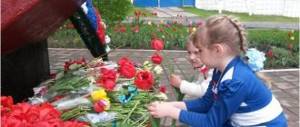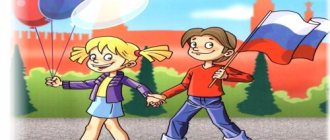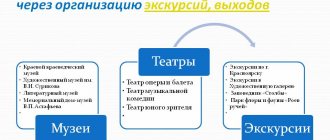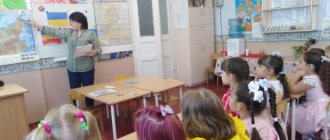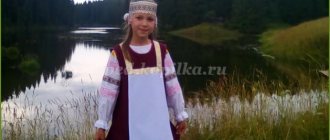MAGAZINE Preschooler.RF
PATRIOTIC EDUCATION OF PRESCHOOL CHILDREN IN ACCORDANCE WITH GEFRaising patriotism in children is one of the most pressing problems today. Preschool educational institutions are the very first link in the education system. They form in children a basic understanding of the world around them, of man’s relationship to nature, to his small Motherland, to his Fatherland, to the formation of a stable connection between generations, which leads to the development of a morally healthy, viable population. The formation of these values occurs as a result of everyday, purposeful, systematic work with the child.
One of the components of the educational areas “Social and communicative development” of the Federal State Educational Standard for Education is the patriotic education of preschool children, positive socialization of preschool children, familiarization of children with sociocultural norms, traditions of the family, society and state.
Patriotism is a manifestation of love not only for a beautiful and strong, powerful country, but also for a country that finds itself in a difficult situation: misunderstanding, poverty, discord, or military conflicts. Fostering patriotism, citizenship, and responsibility for the fate of one’s country today is becoming one of the most important tasks of education.
K.D. Ushinsky wrote that “A child has nothing to deny, he needs positive food, only a person who does not understand the needs of childhood can feed him with hatred, despair and contempt.”
Patriotic feeling is multifaceted in its content. This includes love for one’s family, one’s native places, pride in the people, a sense of one’s connection with the outside world, and the desire to preserve and increase the wealth of the country. Understanding the importance of this issue, one of the most important areas in preschool educational institutions is the work on civic-patriotic education.
The goal of our preschool educational institution is to instill love for the Fatherland and pride in its culture.
Tasks:
- to educate little patriots of Russia, citizens of a legal, democratic state, respecting the rights and freedoms of the individual, showing national and religious tolerance, respect for the languages, traditions and culture of other peoples
- nurturing a child’s love and affection for his family, home, kindergarten, street, city
- showing friendly attention to others, the desire to provide help and support to another person
- caring attitude towards the surrounding nature, the results of other people’s work, other people’s and one’s own things.
- formation of basic knowledge about human rights
- introducing children to the symbols of the state (coat of arms, flag, anthem)
- developing a sense of responsibility and pride for the country's achievements.
This serious work is significant today, because in the last few years there have been significant changes in the political, economic and cultural life of the country. Tolerance is cultivated through the development of good manners, habits, and a culture of interpersonal communication in a world of unlike people.
The solution to these problems occurs in all types of activities of children in preschool educational institutions: in games, in work, in education, in everyday life, in joint activities of children and teachers.
Work is carried out in the following areas:
- Support with methodological support resources;
- Work with children;
- Working with parents.
All these areas are interconnected and include:
- Getting to know your city and its history;
- Getting to know Russia and your native land;
- Getting to know the historical events of your people and country;
- Getting to know the heroes of epics and their exploits;
- Acquaintance with the symbols of the state, republic, city.
Methodological support
Formation of a subject-development environment with a patriotic orientation:
- In the lobby of the kindergarten there are stands: “My Country”, “My City”;
- The groups have a set of didactic games: “Military equipment”, “Find the Russian flag”, “Defenders of Russia”, etc.;
- A selection of fiction and methodological literature has been made, through which children can receive information about exploits during the Second World War, about Russia and its army, etc.;
Thematic planning contributes to the systematic acquisition by preschoolers of knowledge about the country, region, and locality where they live. Topics are repeated in each group. Only the volume of cognitive material, content and complexity, and duration of study change depending on the age of the children in the group.
While working on the topic of patriotic education in preschool educational institutions, we must also remember the current events. For example, the 2014 Sochi Olympics went down in history - children should be proud of our athletes and their country.
Work with personnel.
The goal of methodological work with personnel is to improve the work of preschool educational institutions on the problem of patriotic education. Personal example, a teacher’s worldview, judgment, and life position are the most effective factors in education. The teacher’s knowledge will not be effective if he does not love his country, people, city. In education, everything comes down to the personality of the teacher.
Work with children.
Civic-patriotic education is one of the main and difficult tasks of a preschool institution. The problem is difficult to solve due to the age characteristics of children. Indeed, in preschool age, not a single moral quality is completely formed, but only in its infancy. Raising a patriotic feeling in preschoolers is a complex and lengthy process that requires significant personal conviction from teachers. This work needs to be carried out in all age groups, types of activities and in all areas.
The teacher's task:
- Instilling in children the concepts of “duty to the Motherland”, “hatred of the enemy”, “love of the Fatherland”, “front-line and labor feat”;
- Acquaintance with other cities, the capital, symbols of the state;
- Showing the big through the small, how the activity of one person is connected to the lives of all people.
Communication between the teacher and other preschool specialists:
- Speech therapist - teaches the pupils sentences, nursery rhymes, tongue twisters, folk comic poems, shows the beauty and richness of the native language;
- A physical education instructor organizes and conducts outdoor games of different peoples of the country.
- The music director learns Russian folk songs with the students, introduces them to folk music, and conducts patriotic and folklore holidays;
- On Monday, teachers conduct mandatory conversations: “How was your weekend?” - this is how love and affection for the family is nurtured. During the week, conversations are held: “Who needs help and how to get it?”, “What new poems or stories of Russian writers have you heard?”
The purpose of this work is to create conditions for children to reflect their acquired knowledge and ideas in various types of children’s activities.
Every year our preschool hosts festive events:
- National and folklore holidays: Maslenitsa, Defender of the Fatherland Day, New Year, Victory Day, Cosmonautics Day, Knowledge Day, City Day.
- International holidays - Children's Day, Mother's Day, International Women's Day.
- Orthodox holidays - Easter, Christmas.
- Household and family holidays - school graduation, birthdays.
The holidays are accompanied by good music, colorful decoration of the hall, walking verandas, groups, story games, and various surprises.
Orthodox holidays and rituals are a source of knowledge of the people's soul, wisdom, traditions and way of life of our people.
In introducing a child to folk culture, folk holidays play a special role as an expression of national character, a vibrant form of recreation for children and adults united by joint actions.
In our kindergarten there is a tradition: on the eve of Victory Day, children of senior and preparatory groups go to the eternal flame to bow to the fallen soldiers and lay flowers as a sign of gratitude. After such events, children are inspired to create new drawings, games, and stories.
Civic-patriotic education occurs in the process of activity, during which collective relations between people are formed. In study and work, a person’s spiritual and physical strength is developed, a sense of duty and responsibility for the assigned work, for one’s own successes and the successes of the team is formed, character is formed, and the will is strengthened.
The game simulates situations similar to life, which require a certain line of behavior, mutual understanding, mutual assistance, and camaraderie from athletes.
Working with parents
Relationship with the family of a preschooler is an important condition for the introduction of patriotic education in preschool educational institutions. Today this work is relevant and complex, it requires patience and tact, since in modern families the issue of instilling patriotism is not always considered important and causes confusion. To ensure that work with parents does not remain within the framework of pedagogical education, we involve them in the process of patriotic education through interaction: involving children and parents in a common cause (participation in projects, games, competitions). In our kindergarten, it has become traditional to hold competitions for the best winter and summer playgrounds, when parents jointly create snow buildings and slides for their children, and help plant landscaping areas. Looking at them, children try to become active participants in a common cause, take on what they can, and strive to do something for others.
Family excursions around the city, microdistrict, visits to individual enterprises and premises, organization of photo exhibitions and drawings and other “Children-Parents” projects are of great importance. Family study of their ancestry allows children to understand that the family is a unit of society.
So, patriotic education in a preschool institution is a long process of forming a conscious person who loves his homeland, the land where he was born and grew up, who is proud of the historical achievements of his people, their culture.
Bibliography:
- Alexandrova E.Yu. System of patriotic education in preschool educational institutions: Planning, pedagogical projects, development of thematic lessons / E.Yu. Alexandrova, E.P. Gordeeva, M.P. Postnikova, G.P. Popova. — Volgograd: “Teacher” . - 2007. - 203 p.
- Bondarenko T.M. Diagnostics of the pedagogical process in preschool educational institutions: A practical guide / T.M. Bondarenko. — Voronezh: IP Lakotsenin. - 2010. - 176 p.
- Doronova T.N. Rainbow: Program for the upbringing, education and development of children from 2 to 7 years old in a kindergarten / T.N. Doronova, S.G. Yakobson, E.V. Solovyova T.I. Grizik, V.V. Gerbova. - M.: Education, 2011. - 111 p.
- Sazhina S.D. Drawing up working curricula for preschool educational institutions [Text]: methodological recommendations / S.D. Sazhina. — M.: shopping center. "Sphere" , 2010. - 112 p.
| Next > |
The essence of the requirements of the Federal State Educational Standard
The main requirement of the Federal State Educational Standard for instilling patriotism in preschoolers is regular and purposeful work with children
The set of mandatory requirements for the curriculum at a certain level of education, that is, the Federal State Educational Standard, determines the content side of the implementation of the educational process among children, including those related to the patriotic education of preschoolers. And before we talk about the factors that form this educational component, let us dwell on the fundamental concepts of the issue.
So, patriotism is a social character trait, determined by attachment to everything connected with the region where a person was born and raised.
Moral and patriotic education is a set of activities, the main goal of which is to systematically educate citizens of any age of national identity, as well as a sense of responsibility towards the Motherland, its improvement and security.
Relevance
Willingness for sympathy and empathy determines children's receptivity to patriotic education
This is interesting. Great teacher V.A. Sukhomlinsky wrote: “Childhood is an everyday discovery of the world, and therefore it must be done so that it becomes, first of all, a knowledge of man and the Fatherland, their beauty and greatness.”
Children from 3 to 6 years old, that is, from the time they start attending kindergarten, are in the process of laying and forming personality guidelines, which allows them to carry out educational work most effectively. The following factors also contribute to this:
- increased emotionality of children (readiness for sympathy and empathy allows the use of such forms of interaction as, for example, preparing projects for Victory Day, which put the child in the position of a participant involved in a particular event in the history of the country);
- inquisitiveness (at this age children are interested in absolutely everything, so an adult only needs to find a suitable form to implement the specific tasks of instilling patriotism);
- exposure to the authoritative influence of elders (preschoolers a priori perceive an adult as an object to follow, that is, they trust and fulfill his requirements).
Tasks
Role-playing is one of the most effective techniques for solving the problems of patriotic education
This is interesting. Famous Soviet philologist, culturologist, art critic, academician of the Russian Academy of Sciences D.S. Likhachev said: “Love for the native land, knowledge of its history is the basis on which the growth of the spiritual culture of the entire society can take place.”
The main task of the practical implementation of the system of patriotic education is that young citizens need to be instilled
- love for your city, the street where the baby lives;
- a feeling of special pride in the history of one’s country;
- respect for the cultural heritage of previous generations;
- tolerance to different traits of national character;
- self-respect, which is an integral part of a citizen’s self-awareness;
- respectful attitude towards representatives of other nations, as well as your peers, relatives and people around you.
Federal State Educational Standards requirements for instilling patriotism in preschoolers
To cultivate love for one’s land, it is possible to use all types of activities, including drawings on the topic
The goals that, according to the requirements of the Federal State Educational Standard, need to be achieved as part of the implementation of moral and patriotic educational work with children, come down to the following
- nurturing pride and unconditional love for one’s homeland;
- careful attitude towards natural resources and people inhabiting the country;
- maintaining connections between generations;
- preserving and nurturing the traditions of their fellow citizens.
To implement these requirements, work with children must be
- purposeful (any work carried out in a children's team must contain an educational component regarding patriotism in relation to one's country);
- systematic (work should be carried out regularly, fitting into the context of different activities and games, and on the eve of public holidays, separate events and projects should be prepared, for example, the “Voices of Victory” matinee dedicated to songs of the war years, which is held on the eve of Victory Day);
- universal (the solution of educational problems should occur at all levels of interaction of the child with other people - family, peers and teachers).
Federal State Educational Standards program
The program for instilling patriotism according to the Federal State Educational Standard includes mandatory events for important historical dates.
The system for introducing the program of patriotic education of children into practice includes three stages, each of which solves certain problems.
| Stage | Goals |
| Acquaintance with concepts and objects of the immediate environment | · fostering respect for work (the results of folk art, local arts and crafts); · meeting people who have glorified the country; · fostering a friendly attitude towards other peoples. |
| Getting to know the life of the country's society | · fostering a sense of belonging to the past, present and future of the country through familiarity with memorable dates and national holidays; · careful attitude towards the work of fellow citizens; · expanding ideas about the country, hometown, capital, as well as state symbols; · study of city sights, architectural monuments, history of street names. |
| Getting to know the local nature | nurturing love for the surrounding nature; · studying approaches to preserving the surrounding flora and fauna; · fostering a sense of personal involvement in the cause of protecting the nature of the native land. |
These stages and goals are identical at all levels of preschool education, that is, in the junior, middle and senior groups. The differences will only be in the volume of content, as well as in the choice of certain forms, which are determined by the methodological council, based on the system of work of a particular kindergarten (for example, if we are talking about preschool institutions of cultural centers in Russia, then visiting exhibitions and theaters will be one of the preferred forms of working with children). In general, these can be
- thematic classes;
- conversations about the native land, nature, famous people;
- reading books on suitable topics;
- a selection of poems and songs;
- watching popular science films and programs;
- games;
- visiting exhibitions;
- compilation of albums;
- projects, etc.
Patriotic education also includes working with parents (for example, joint preparation of thematic matinees or projects, exhibitions, crafts) and employees of local cultural centers (for example, involving employees of a local museum for an excursion).
Diagnostics of patriotic education of preschool children
Dramatization of folk tales is also one of the methods of instilling patriotism.
The teacher, as well as a psychologist, music worker, choreographer, and methodologist are involved in bringing the program to life. To determine the quality of implementation of the goals of moral and patriotic education of preschoolers, special diagnostics are used, which are carried out by the group teacher together with other members of the methodological council (most often with a defectologist, if we are talking about a correction group, or a psychologist) . Diagnostics is based on observation of each child (and this is how the individualization of education manifests itself) during the school year. For each of the selected criteria, thematic control is carried out in the form of the following assessments: high level, average level or low. In the middle and at the end of the school year, kindergarten methodologists check diagnostic cards, together with the teacher, outline, if necessary, changes in the strategy of the child’s individual educational route (see the article What is an individual educational route for a preschooler and how to work with it), and also make a promising plan for moral and patriotic education for the next year. As a rule, diagnostics are presented in the form of an individual card, which includes the following items:
- section title;
- evaluation criteria;
- thematic control at the beginning of the school year;
- mid-year assessment;
- control assessment at the end of the school year.
Approximate monitoring map for civic-patriotic education of preschool children (senior group)
| Chapter | Criteria | Started the school year | Middle of the school year | End of the school year |
| Introduction to yourself and your family | Knows his first and last name. | |||
| Knows the names, patronymics of parents, their place of work. | ||||
| Knows home address and phone number. | ||||
| Familiar with your ancestry. | ||||
| Ideas about kindergarten | He orients himself in the kindergarten premises, knows their names and functions. | |||
| Knows the address of the kindergarten | ||||
| Has an idea of the professions of kindergarten employees. | ||||
| Idea of a person | Has ideas about primitive people. | |||
| Knows about basic human needs (healthy lifestyle). | ||||
| Has an idea of the life of people in other countries. | ||||
| Has ideas about the peoples inhabiting the region. | ||||
| Ideas about one's home country | Knows the name of the city, streets, squares. | |||
| Knows the symbols of his hometown (flag, coat of arms) | ||||
| Knows the sights of the city (museum, youth palace, cultural centers...) | ||||
| Knows the name of the country, its capital and symbols of Russia (flag, coat of arms, anthem) | ||||
| Concept of culture | Familiar with applied art (“Dymka”, “Khokhloma”, “Gorodets”, “Gzhel”...) | |||
| Has an idea of folk holidays and traditions | ||||
| Understanding Geographic Components | Has an idea about planet Earth | |||
| “Orients” by map and globe (water-land; sea; ocean-continent; pole; equator...) | ||||
| Knows natural climatic zones and their inhabitants (desert, tundra, tropics) | ||||
| Knows about the natural features of our region (plants, animals, climate) |
High level - knows his first name, last name, name of the city, country, his address; names and recognizes (by illustration) sights, green areas of the city, 4-5 streets, squares; knows and recognizes the flag, coat of arms, anthem of Russia; city coat of arms; names folk holidays, toys, household items; names the natural resources of Russia, knows the natural and climatic zones, landscapes; cares about the surrounding nature, loved ones, provides assistance, shows friendliness, takes into account the interests of comrades, knows how to come to an agreement with peers, and analyzes actions. Has an idea of family members and immediate relatives. Intermediate level - knows his first name, last name, name of the country, city, his address; flag, coat of arms, anthem of Russia, coat of arms of the city; finds it difficult to name attractions, green areas, streets, squares of the city (does this after explanations from an adult); finds it difficult to name folk holidays and toys; with the help of an adult, names the natural resources of Russia, natural and climatic zones; cares about loved ones, shows friendliness, but does not take into account the interests of his comrades, does not know how to come to an agreement with them, does not provide assistance; analyzes actions with the help of an adult. Low level – does not know the name of the country or city. His address, but recognizes the flag, coat of arms, anthem; lack of knowledge about the sights of your hometown; doesn't know street names well. Prospects; cannot name folk holidays, toys; natural resources of Russia, natural and climatic zones; does not care about those around him, does not show friendliness, does not take into account the interests of his comrades, does not know how to come to an agreement with them, does not provide assistance, and cannot analyze actions.
Rudenko Marina Anatolevna
https://nsportal.ru/detskii-sad/vospitatelnaya-rabota/2015/01/20/diagnostika-po-patrioticheskomu-vospitaniyu
